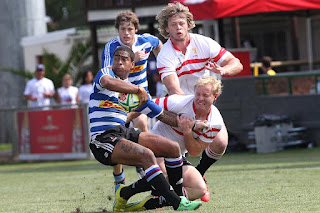The origins of Rugby League can be traced back to Northern England in 1895. At the time, Rugby Union was an amateur sport, and players were not compensated for their participation. This led to tensions between players from the working-class communities who struggled to balance their work obligations with the demands of the game. The desire for compensation and fair treatment ultimately sparked a significant split.
In Huddersfield, a meeting was held by representatives from clubs discontented with the Rugby Football Union's refusal to consider financial compensation for players. This gathering led to the formation of the Northern Rugby Football Union (NRFU), later renamed the Rugby Football League (RFL), which laid the foundations for Rugby League.
The new code, Rugby League, introduced several rule changes to differentiate itself from Rugby Union. One of the most notable changes was the adoption of a more structured, less contested scrum, which allowed for faster, more fluid gameplay. The introduction of a play-the-ball rule after a tackle further emphasized the speed and continuity of the game.
Rugby League's popularity grew rapidly in Northern England, particularly in industrial towns where working-class communities embraced the sport wholeheartedly. It offered an accessible and affordable form of entertainment, and its fast-paced nature appealed to both players and spectators.
The sport's success prompted the expansion of Rugby League beyond the British Isles. In 1907, the first international matches were played between England and Australia, leading to the establishment of regular international competitions. Rugby League also found popularity in other countries such as New Zealand and Papua New Guinea, becoming a beloved sport with passionate fan bases.
Throughout its history, Rugby League has seen further refinements and developments, with advancements in tactics, player fitness, and global competitions. The sport's flagship event, the Rugby League World Cup, has been held since 1954, showcasing the finest talent from around the globe.
Rugby League's journey from its breakaway origins to its present-day status as a thrilling sport is a testament to its enduring appeal. It embodies the resilience and passion of its players and fans, offering a unique blend of physicality, skill, and strategy.
So, whether you're a fan of Rugby League or new to the sport, delve into its rich history and immerse yourself in the excitement of this fiercely contested game.
Photo: Pixabay (free)

No comments:
Post a Comment
Thanks for your comment.